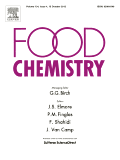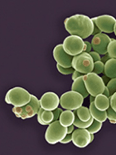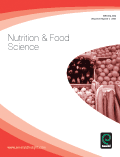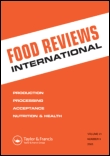
Foods and Raw Materials
Scope & Guideline
Elevating knowledge in food safety and sustainability.
Introduction
Aims and Scopes
- Food Chemistry and Biochemistry:
Research that explores the chemical and biochemical properties of food components, including phytochemicals, antioxidants, and nutrients, to understand their roles in health and nutrition. - Functional Foods and Nutraceuticals:
Studies investigating the health benefits of functional foods, including the development and evaluation of products enriched with bioactive compounds. - Food Safety and Quality:
Research on the microbiological safety, quality management, and shelf life of food products, as well as the impact of processing methods on food safety. - Innovative Food Processing Techniques:
Exploration of new technologies and methodologies in food processing, including encapsulation, fermentation, and preservation techniques. - Sustainable Food Practices:
Research focusing on sustainable practices in food production and processing, including waste reduction, eco-friendly packaging, and the use of alternative ingredients. - Nutritional Studies and Dietary Impact:
Investigations into the nutritional profiles of various food products and their effects on health, including studies on dietary patterns and food preferences.
Trending and Emerging
- Health-Promoting Properties of Phytochemicals:
A significant increase in studies exploring the health benefits of phytochemicals, particularly from plants, suggests a growing interest in natural products as functional ingredients. - Probiotics and Gut Health:
Research on probiotics, their effects on gut health, and their incorporation into various food products is becoming increasingly prominent, reflecting current trends in nutrition and health. - Food Technology Innovations:
Emerging themes in innovative food processing techniques, such as microencapsulation and novel extraction methods, are gaining attention as researchers seek to enhance food quality and shelf life. - Sustainable Food Production Practices:
An increasing number of studies focus on sustainable practices in food production, including the use of alternative proteins and environmentally friendly processing methods. - Digital Transformation in Food Systems:
The integration of digital technologies and data analytics in food production and safety monitoring is emerging as a new research frontier, reflecting the industry's adaptation to technological advancements.
Declining or Waning
- Traditional Processing Methods:
Research on conventional food processing techniques is becoming less frequent, possibly overshadowed by innovative approaches and new technologies that address modern consumer needs. - Animal-based Products:
There is a noticeable decline in studies focusing solely on animal-based food products, as interest shifts towards plant-based alternatives and functional foods derived from plants. - Local and Regional Food Studies:
There appears to be a waning interest in localized studies of food systems, as global perspectives and broader dietary impacts gain more attention in current research. - Nutritional Studies without Functional Context:
Research that focuses on basic nutritional analyses without linking findings to functional or health-related outcomes is decreasing, reflecting a trend towards studies that emphasize practical applications.
Similar Journals

eFood
Pioneering insights in food technology and nutrition.eFood is a pioneering journal in the field of food science, published by the esteemed WILEY. With its impactful emergence, the journal has rapidly established itself within the academic community, evidenced by its impressive Q1 category ranking in Food Science as of 2023, and a commendable position at Rank #95 out of 389 in the Scopus database. Covering a wide spectrum of topics related to food innovation, technology, safety, and nutrition, eFood serves as an indispensable platform for researchers, industry professionals, and students who are at the forefront of advancing our understanding of food systems. The journal notably operates with an open-access model, promoting wide dissemination of knowledge while enhancing the visibility of high-quality research. As we look forward to converging years from 2020 to 2024, eFood is poised to foster rigorous scientific discourse and contribute significantly to the future of food science research.

Food Chemistry
Advancing Knowledge in Food Composition and SafetyFood Chemistry, published by Elsevier Science Ltd, is a leading international journal dedicated to the publication of high-quality research in the field of food chemistry. Established in 1976, this journal has made a significant impact in its realm, with an impressive 2023 impact factor and ranked Q1 in Analytical Chemistry, Food Science, and miscellaneous Medicine categories. It currently holds a remarkable Scopus ranking of #3 in Analytical Chemistry and #11 in Food Science, signifying its relevance and prestige among the top scholarly publications. With a wide scope that includes the chemistry of food composition, flavor, and safety, Food Chemistry serves as an essential resource for researchers, professionals, and students alike, offering insights and advancements in food analysis and technology. Access options may vary, and the journal is committed to disseminating innovative findings to foster knowledge and application in the dynamic field of food science.

Annual Review of Food Science and Technology
Empowering Scholars in the Evolving World of Food ScienceThe Annual Review of Food Science and Technology, published by ANNUAL REVIEWS, is an esteemed journal dedicated to advancing the knowledge within the field of food science. With an impressive Q1 ranking in the Food Science category, and ranking as #6 out of 389 in the Scopus Agricultural and Biological Sciences category, the journal serves as a vital resource for researchers, professionals, and students. This publication encapsulates comprehensive reviews and cutting-edge research, helping to bridge the gap between research and practical application. Though it does not offer Open Access, it provides valuable insights into various aspects of food science from 2010 to 2024, ensuring that its readership stays at the forefront of emerging trends and innovations. The journal's focus on high-quality, peer-reviewed articles makes it a critical platform for scholars looking to deepen their understanding and contribute to this rapidly evolving field.

Ukrainian Food Journal
Fostering collaboration in food science and biochemistry.Ukrainian Food Journal is an esteemed open-access journal dedicated to advancing the field of food science and biochemistry. Established in 2012 and published by the National University of Food Technologies in Ukraine, the journal serves as a vital platform for researchers and professionals to disseminate their findings on food technology, safety, and nutritional biochemistry. With an ISSN of 2304-974X and E-ISSN 2313-5891, it offers a wealth of knowledge to its readers, promoting innovation and collaboration within the industry. While currently categorized within the Q4 quartile of biochemistry and the Q3 quartile of food science, the journal is progressively gaining recognition, reflecting a commitment to quality research in a competitive field. The journal is indexed in Scopus, ranking #271 in Food Science and #376 in Biochemistry, underscoring its relevance and contribution to agricultural and biological sciences. The Ukrainian Food Journal not only enriches the academic community with its open-access model but also aims to foster dialogue among researchers, professionals, and students dedicated to improving food systems and nutrition. It operates from its headquarters in Kyiv, offering a hub for creativity and advancement in food-related research.

Nutrition & Food Science
Elevating food science and nutrition through rigorous scholarship.Nutrition & Food Science, published by EMERALD GROUP PUBLISHING LTD, is a prominent journal dedicated to advancing the understanding of nutritional science and food technology. With an ISSN of 0034-6659 and an E-ISSN of 1758-6917, this journal has provided a platform for scholarly articles, reviews, and insightful research since its inception in 1971. The journal is recognized in the Q3 quartile for both Food Science and Nutrition and Dietetics categories, showcasing its moderate impact within the field. Currently ranked #202 in Food Science and #81 in Nutrition and Dietetics based on Scopus metrics, it caters to a diverse audience of researchers, practitioners, and students eager to explore the latest findings and developments. While not an open-access journal, it offers various subscription options for individuals and institutions keen on accessing high-quality research. With a commitment to interdisciplinary collaboration and practical applications, Nutrition & Food Science is an essential resource for those invested in improving health outcomes through informed dietary practices and food innovations.

FOOD REVIEWS INTERNATIONAL
Elevating Standards in Food Safety and ProcessingFOOD REVIEWS INTERNATIONAL, published by Taylor & Francis Inc, serves as a pivotal resource within the fields of Food Science and Chemical Engineering. Established in 1985, this esteemed journal offers a comprehensive platform for the dissemination of critical reviews that enhance understanding and innovation in the food industry. With an impressive impact factor reflecting its Q1 quartiles in both Food Science and Chemical Engineering categories, it ranks among the top journals in Scopus, securing the 24th spot in Agricultural and Biological Sciences. Scholars, researchers, and professionals are encouraged to explore its rich content, which spans meticulously reviewed articles that bridge academic research and practical applications, while contributing to advancements in food safety, processing, and sustainability. Although not an Open Access journal, access to its extensive repository is vital for anyone aiming to stay at the forefront of food science advancements.

Journal of Food Science and Technology-Ukraine
Pioneering Research in Food Science and TechnologyJournal of Food Science and Technology-Ukraine, published by the Odesa National University of Technology, stands as a pivotal platform dedicated to the dissemination of high-quality research in the field of food science and technology. With its open access policy established in 2014, the journal fosters global knowledge sharing and accessibility, enabling researchers, professionals, and students to access critical findings and advancements in food technology without barriers. The journal's commitment to publishing innovative studies, reviews, and case analyses reinforces its role in addressing contemporary challenges in food safety, preservation, processing, and nutritional quality. With ISSN 2073-8684 and E-ISSN 2409-7004, it serves as a valuable resource for the academic community, supporting the advancement of food science knowledge and its practical applications.

CZECH JOURNAL OF FOOD SCIENCES
Unveiling New Discoveries in Food Systems and SafetyCzech Journal of Food Sciences is a premier publication in the field of food science, disseminating vital research since its inception in 1999 and transitioning to Open Access in 2007. Published by the Czech Academy Agricultural Sciences, this journal facilitates the exchange of knowledge among researchers, professionals, and students dedicated to advancing the understanding of food systems, safety, and technology. With an ISSN of 1212-1800 and an E-ISSN of 1805-9317, it holds a respectable position with a Q3 ranking in the Food Science category for 2023, illustrating its commitment to high-quality research despite its Scopus rank of 209 out of 389, situated in the 46th percentile. Located in the heart of the Czech Republic, at TESNOV 17, PRAGUE 117 05, this journal serves as an essential resource for those involved in agricultural and biological sciences, paving the way for innovative discoveries and applications in food science.

Acta Scientiarum Polonorum-Technologia Alimentaria
Elevating Standards in Food Technology ResearchActa Scientiarum Polonorum-Technologia Alimentaria, published by Poznan University of Life Sciences, is a revered journal in the field of food science, showcasing cutting-edge research and innovations in food technology. Established as a leading platform within its domain, this journal is indexed under Scopus and ranks in the 2023 Q3 quartile for Food Science, demonstrating its commitment to high-quality scholarship. With an ISSN of 1644-0730 and E-ISSN 1898-9594, it serves as a critical resource for researchers, professionals, and students seeking to stay at the forefront of advancements in food safety, quality control, and sustainable practices. The journal has also been recognized for its contributions to the agricultural and biological sciences, positioning itself at rank #205 out of 389 in this competitive field. While currently not offering open access, the journal's valuable insights and findings, especially as it publishes through 2024, play a crucial role in advancing knowledge and fostering collaboration among experts in the food science sector.

Foods is a premier open access journal published by MDPI, based in Switzerland, that has been at the forefront of disseminating high-quality research in the fields of food science, health professions, and plant science since its establishment in 2012. With an impressive convergence of interdisciplinary studies spanning various aspects of food, nutrition, and microbiology, the journal aims to provide a comprehensive platform for researchers and professionals to share innovative ideas and findings. Maintained as a Q1 journal in multiple categories for 2023, including Food Science and Health Professions, Foods has garnered significant recognition within the academic community, reflected in its strong Scopus rankings and percentiles across various disciplines. The journal not only promotes open access to enhance the visibility and accessibility of research but also encourages the exploration of sustainable food systems and health-related issues, thus contributing to essential discussions in today's society. For those looking to advance their understanding and expertise in food-related sciences, Foods serves as an enduring resource for groundbreaking studies and critical insights.